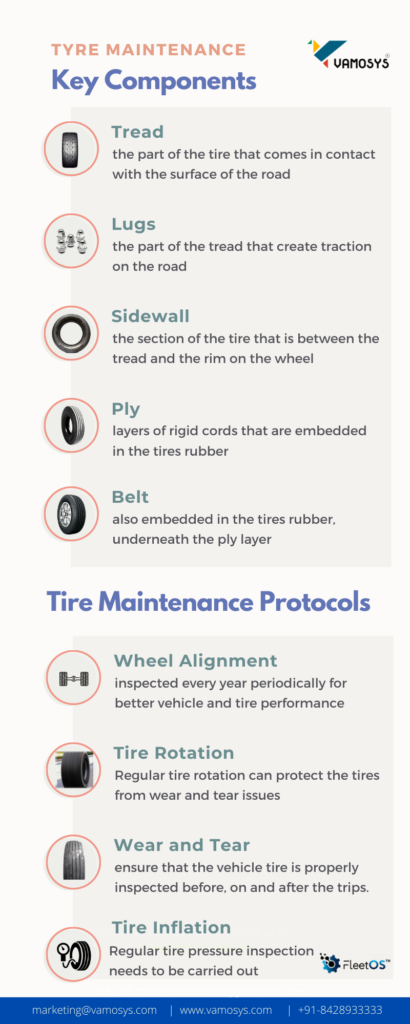Importance of Tire Maintenance
Summary
Proactive tire maintenance is essential for vehicle safety, stability, and performance. Choosing the right tire, maintaining proper tire pressure, and regular tire inspection are important factors for tire safety.
Fleet managers and drivers should follow tire maintenance protocols such as wheel alignment, tire rotation, and wear and tear monitoring to increase tire lifespan and reduce downtime. False myths surrounding tire selection and rethreading should be avoided.
Regular tire maintenance improves safety, fuel consumption, and tire life.
Proactive tire maintenance has various benefits as it improves safety on the road and brings more stability to the fleet organization. It may look simple and daily routine check-ups on the tires but it reduces the downtime that in turn increases the productivity coupled with vehicle performance. Proper tire maintenance helps in increasing tire shelf life with proper treading and also saves fuel economy in logistics operations.
Be it heavy load carrying trucks or passenger vehicles, tire maintenance is vital for the transportation business. We will discuss in detail the tire safety, maintenance protocols and benefits of it in this article.
Tips for Tire Safety
1. Choose the right tire
Fleet managers and vehicle owners should choose the right tires for the vehicle after considering major factors such as the size of the tire, vehicle load carrying capacity, service type to follow, the route on which the vehicle is going to travel.
Depending on the above-mentioned factors correct tires should be chosen. Choosing the right tire alone won’t be sufficient for the vehicle, it should be properly maintained with proactive maintenance schedules using software applications for the smooth operation of the business.
The right tire chosen with proper maintenance will provide long-term performance and safety to the vehicle and logistics organisation.
2. Proper maintenance of tire pressure
Tire inflation pressure is one of the critical factors in vehicle tire maintenance. Improper tire pressure may lead to vehicle breakdown and it may even damage the vehicle tire castings.
Properly inflated tires will distribute the load evenly or else the load distribution will be improper further leading to vehicle performance. It will also affect the treadwear of the vehicle and fuel efficiency.
Tire inflation pressure needs to be checked when the tire is cold. The ideal time to measure the tire pressure is after the two-three hours of vehicle parking. The tire pressure needs to be calibrated using the tire pressure gauge at each wheel position.
3. Regular Tire inspection
Tire inspection needs to be done on regular basis to check the wear and tear issues, tread depth of the tire, tire damage that occurred on the trip. Fleet managers should ensure that the drivers do the regular check of tires before the start and end of each trip, identify cracks, bulges, and any other penetrations that occurred on the tire.
Regular inspection of tires will reduce tire damage and increase the life span of tires along with improved vehicle performance and reduced downtime.
False Myths surrounding Tire
There are a lot of myths surrounding tires for the vehicle. People across the globe believe myth faster than without understanding reality and fact.
The one popular myth about tires is all tires are equal.
For laymen, it seems all tires are equal and only the size varies according to the vehicle. But the fact is, it is not. The tire selection for the vehicle varies according to the requirement of the workload. The fleet manager in the logistics organisation should choose the tire wisely after considering the factors such as Gross Axle Weight Rating (GAWR), vehicle speed, road conditions, vehicle load range and other factors such as size.
So size is not the only factor, there are other factors too!
Another popular myth that is surrounding the tire is regarding tire threading.
Rethreading of the tire helps to extend the life of the tire. The treading can be done more than two times to extend the life span of the tire. Rethreading doesn’t affect the quality of the tire, rather it supports better performance of both vehicle and tire.
What drivers should do on Tire maintenance?
Drivers are the key person in the logistics and transportation industry. They are person travel with vehicles all along and have a close watch on vehicle health.
In a similar way, the driver should keep an eye on the tire inspection on regular basis. Before every trip starts and at the end of the trip inspect the tire for a few seconds. Even during the trip, after a certain distance or time, the tire needs to be checked.
This small routine tire checkup done by the drivers has multiple benefits as it saves tire health, improves vehicle performance, improves fuel efficiency and reduces unwanted downtime during the vehicle trip.
It is essential to all the fleet managers should guide and ensure the drivers to inspect the tire on regular basis for better performance of the vehicle.
Tire maintenance protocols
Proper tire maintenance should be done for better tire performance. To achieve that, the fleet managers should follow the below-mentioned protocols in vehicle tire maintenance.

1. Wheel Alignment
The wheel alignment should be inspected every year periodically for better vehicle and tire performance. If there is any misalignment or vehicle pulling in one direction then driver and fleet manager should inspect the wheel alignment.
2. Tire Rotation
The manufacturer’s manual will provide detailed insights on the vehicle tire rotation. Regular tire rotation can protect the tires from wear and tear issues along with improving tire health life.
3. Wear and Tear Monitoring
The driver should check the tire wear on a regular basis and fleet managers should ensure that the vehicle tire is properly inspected before, on and after the trips.
4. Tire Inflation
Regular tire pressure inspection needs to be carried out, need to check the tire pressure once in every week and for long haul vehicles, periodically after certain kilometers as per vehicle load and running capacity.
Benefits of Tire Maintenance
1. Safety
The safety of the vehicle, driver, and consignment is the utmost priority in the logistics and transportation sector. To ensure safety the vehicle needs to be properly maintained in all aspects especially tires. Because of weekly inflated tires, or because of tire wear issue for that matter any tire-related issue may affect vehicle performance, braking issues, cumulatively affect the performance of the vehicle and safety.
2. Fuel Consumption
Properly inflated tires provide better fuel mileage which in turn reduces the fuel expenses and unwanted stoppages for fuel filling.
3. Tire Life Improvement
Regularly maintained tires along with proper inflation pressure maintenance will improve the tire health life. Vehicle wheel alignment check, load management and tire rotation will further help in tire life span.
4. Cost Savings
Tires that are appropriately kept up with will help a vehicle run all the more proficiently and delay its life. With appropriate tire support, you might actually save two or three tanks of gas every year (contingent upon the mileage driven – it very well may be pretty much). Because of the way that tires will endure longer, you could likewise save the expense of a couple of sets of tires over the normal life expectancy of a vehicle.


